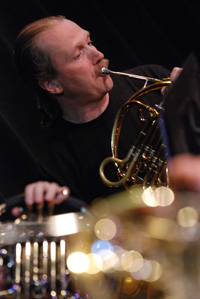Don't see what you're looking for?
Main Site
Berklee.eduCampuses and Schools

Michael Weinstein
For media inquiries, please contact Media Relations
- Third horn with Nashua, New Hampshire, Symphony Orchestra
- Alcyon Chamber Ensemble hornist
- Composer of various large ensemble, chamber, and solo concert music works published by Boosey and Hawkes and Micha Music
- Cofounder, hornist, and artistic director of Capital Brass Quintet
- Member of Berklee Faculty Brass and Woodwind quintets
- Member of Massachusetts Young Audiences North Winds Quintet
- Recipient of U.S. Air Force Arnold D. Gabriel Award
- B.F.A., State University of New York
- M.M., New England Conservatory of Music
- Ph.D., Brandeis University
"I really think it's important to link music theory with the practice of music. I'm actively playing as a hornist, and equally actively creating contemporary concert music as a composer. In the classroom we'll do a counterpoint assignment together on the board. I'll start by putting something up, then have everybody in the class contribute a measure or two, eventually leading up to writing a whole exercise. By the end, when I play what we've written out of thin air on the piano, there's a real feeling of accomplishment."
"The ability to control dissonance and consonance is really important in writing music. There are some conventions in tonal writing, but there's also a great deal of freedom. It's fun to get students to think in terms of independently moving voices in counterpoint, then learn how to handle dissonance and consonance, including the use of the typical expressive non-chord tones."
"I always tell students that their work shouldn't be arbitrary. It shouldn't be an accident that their music sounds good. I want them to be in control, or as my professor Harold Shapero once told me, 'You should push the notes around, not be pushed around by the notes.' I strongly agree with that idea."
"Since I'm also an active hornist, students come to me for private lessons. There's a great demand at Berklee for French horns in recording sessions, in film scoring (composers and arrangers love the horn sound in Hollywood), and brass and woodwind ensembles, so every year we get a couple of players. I try to get them to think about the horn not only just as an historical orchestral or chamber instrument but also as a vehicle for expression in more contemporary musical styles such as jazz, pop/rock, and avant-garde concert music. We even do some improvising, which is comparatively rare for hornists."
Get More Information
By requesting information from Berklee, you will receive emails about our educational programs, student resources, facilities, and more based on your selections.
Thank you for requesting information.
Check your inbox for an email from Berklee. You will start to receive program information, updates, and deadline reminders.
Find the program that's right for you with Berklee's Find Your Program tool.
